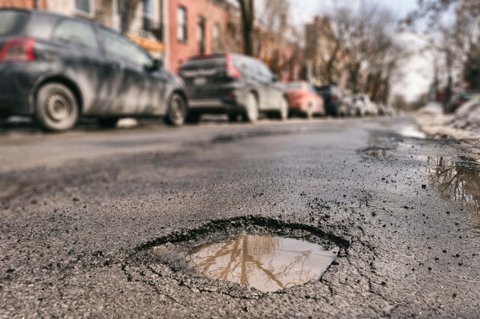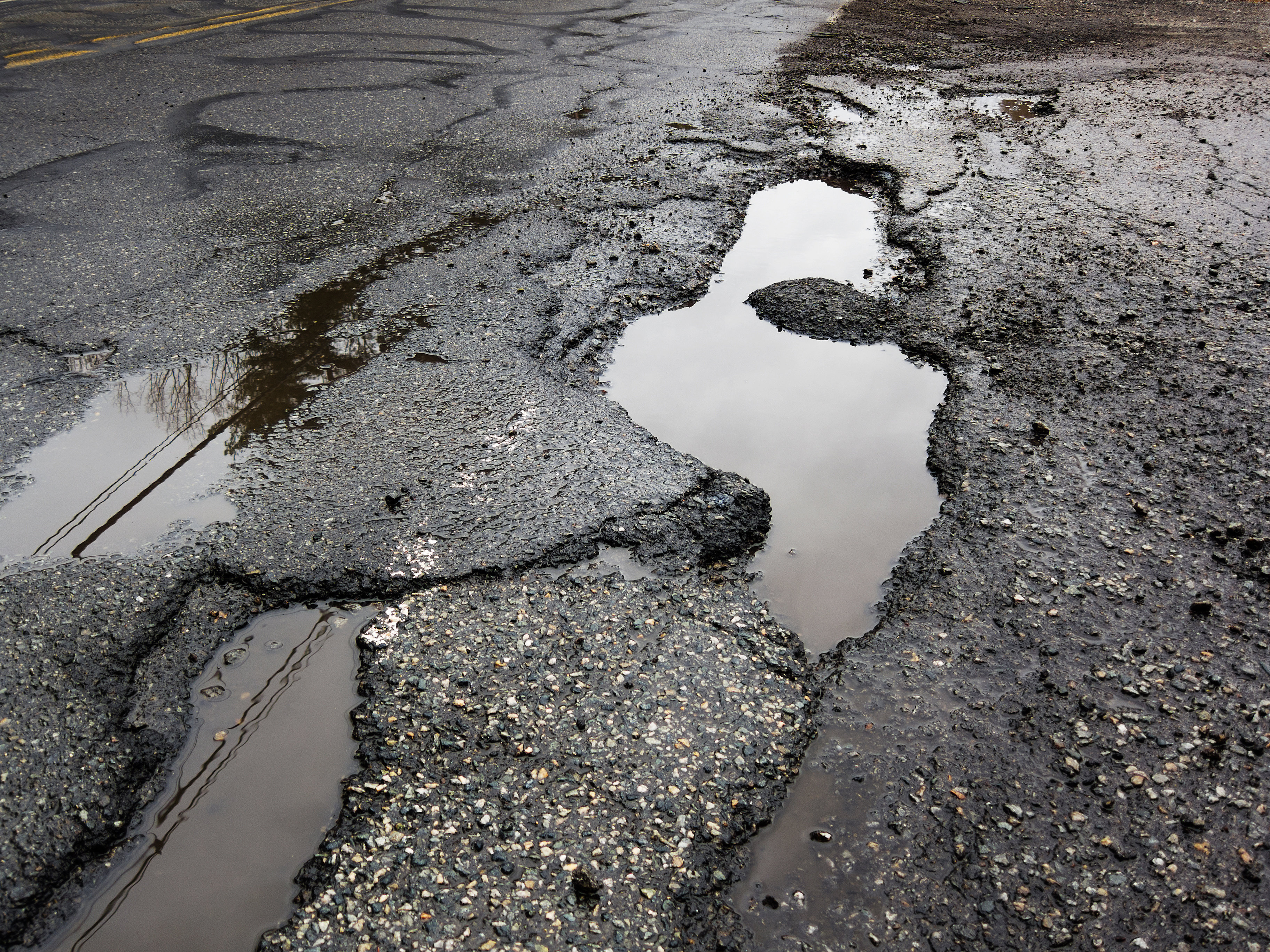Challenges Faced
One of the reasons noted by the AIA in the ALARM survey report this year is that local authorities are having to deal with the challenges of more extreme weather events, as climate change continues to have an impact here in the UK. In addition to this, roads are experiencing increased volumes of traffic in addition to an ageing network, so it is hardly surprising that the data shows that structural conditions of roads continue to decline with 8,000 fewer miles of roads being classified as structurally ‘good’ than reported last year in 2022.
This is not to say that highway engineers are not doing their job of maintaining the roads within the UK to the very best of their ability. It is recognised that there is only so much that can be done with limited resources.
Looking further into the statistics reported by the AIA, they have found that the Road Condition Index (RCI) which reports the condition on the surface of a carriageway, but not necessarily the structure of the road, has shown that there has been a drop in the number of roads classified as ‘green’.
If a road is deemed to be ‘green’ then this would indicate that the road is in a good state of repair. Similarly, a status of ‘amber’ would indicate that the road is showing some signs of deterioration and a status of ‘red’ would reflect that the status of the road is in a poor overall condition.
Somewhat surprisingly, roads classed as red have remained stable since last year with one road in every 9 miles on the local network in England and Wales being likely to require maintenance in the next 12 months.
Concerningly however, the current level of roads in England and Wales which are classed as ‘red’ by the RCI accounts for 11% of the total local road network in England and Wales which is the equivalent of 22,600 miles – or, almost the entire way around the entire world.
Over the past year from 2022 to 2023, the ALARM report indicates that a total of 1.4 million potholes were filled. Although this may seem like a substantial impact, this figure has actually reduced from 1.7 million in the previous year from 2021 to 2022. This remains the equivalent of one pothole being filled every 22 seconds in England and Wales however the total cost of filling these potholes in the years 2022 to 2023 is estimated to be around £93.7 million. The total cost of filling potholes over the last 10 years is over £1 billion.
As a result of the issues faced in relation to potholes, the AIA has stated that structural maintenance is needed when surface maintenance alone just isn’t sufficient. The data concerning structural conditions provides a more holistic assessment of the carriageway asset and this is a matter which needs to be actioned given that, compared with the previous year in 2021 to 2022, there are now more than 8,000 miles less roads classed as ‘good’ this year from 2022 to 2023. This equates to a decrease in roads classed as ‘good’ by 4%.
What Does That Mean For Road Users and Pedestrians?
Potholes are considered unsafe once they have a depth of 22mm on a footpath or 40mm on a road. But repairs should be carried out more frequently if the pothole is located somewhere with heavy traffic or is in an area that is used by vulnerable road users.
If you’ve suffered a pothole injury, you might not be sure if you can make a claim. Our Road Accident Solicitors will listen to your situation as part of an initial claims assessment and let you know if we can help you.
What Should I Do If I've Suffered a Pothole Injury?
Get Medical Support
The most important thing to do if you’ve suffered aninjury caused by a pothole is to seek medical advice as soon as possible. Even if you don’t think your injuries are severe, early assessment by a medical professional can prevent bigger problems from arising in future.
Having documented evidence of the extent of your injuries could also help you if you decide to proceed to make a Personal Injury claim.
Take Pictures
If you’re able to and if it’s safe to do so, you should take photos of the pothole that caused your injury. It can also be helpful to take measurements of the pothole or give perspective by including a ruler in your photos.
A pothole could be filled in after your accident, so it’s important to capture this evidence if you can.
Get Witness Contact Details
If there was anyone around when your accident happened, having their contact information could support your claim.
It’s also likely that any witnesses may be local to the area. If they are, it may be that they’ll have strong opinions on the pothole not being repaired, so it’s worth getting their input.
Additionally, if you happen to know anyone who lives in the local area where your accident occurred or who perhaps works in that area, it may be worth asking them if they’ve noticed the pothole before your accident occurred. It may be that they’re able to confirm how long the pothole has been there which would assist in proving that the local authority has been negligent in failing to fill the pothole which caused your accident for the purpose of any future Personal Injury claim.
The reason for this is that in order to be successful with a claim for Personal Injury arising from a pothole accident, you must be able to show that the pothole was present for a long period of time without the local authority taking any action to repair or fill this to prevent an accident, such as yours, from occurring.
The local authority is required to carry out assessments on different roads throughout different periods of the year so how long the pothole has been present for is really important. Additionally, anyone local to the area may have reported the pothole, in which case the local authority may have known about it prior to your accident.
Report It
You should also report your accident to the Council, Local Authority or Highways England. There’s also an option to report a pothole in England, Scotland and Northern Ireland on the GOV.UK website.
Seek Legal Advice
The final thing you should do if you’ve suffered from an injury due to a pothole is seek legal advice as you may be entitled to compensation. Our expert team of Personal Injury Solicitors will take the details of your accident and injuries before letting you know if we can help you with your claim as part of an initial claims assessment
We’ll also advise you on whether we can handle your case on a No Win, No Fee basis. Our friendly and helpful team can be contacted on 0800 260 5010 or alternatively, you can request a call back.
Are There any Time Limits for Making a Claim?
Generally, you’ll have three years from the date of your accident to make a Personal Injury claim. But it’s best to get legal advice as early as possible, especially as potholes can be filled in at any time, making it difficult to gather evidence.
If you’re making a claim on behalf of a child, you’ll have three years from when they turn 18 years old to make a claim for compensation.
In cases where the person who has been injured doesn’t have mental capacity, the usual time limits may not apply. We can advise you on this.
How Much Compensation Will I Receive From a Pothole Injury Claim?
Any compensation you receive from your pothole injury claim will be divided into two main categories:
- General Damages - covering your pain and suffering as well as the impact your injury has had on your life.
- Special Damages – taking into account any financial losses related to your accident, including time off work, transport to medical appointments or loss of earnings.
As with any Personal Injury claim, the amount you receive in compensation will ultimately depend on the circumstances surrounding your accident and the severity of your injuries. For more advice, get in touch with our expert Personal Injury team.










